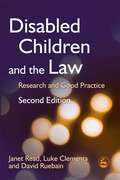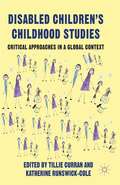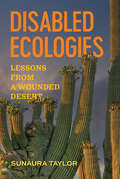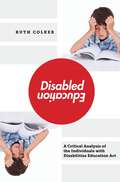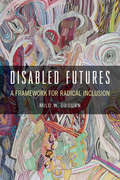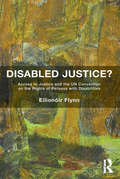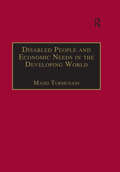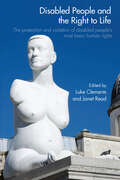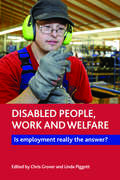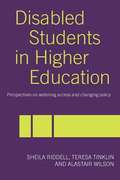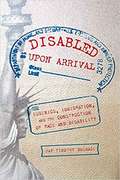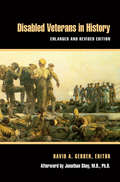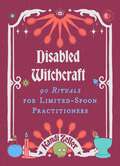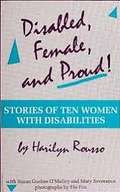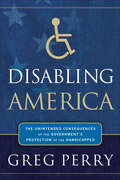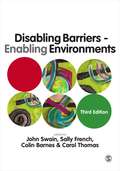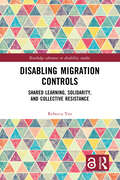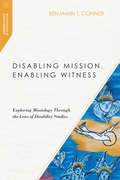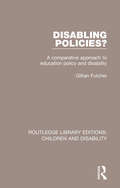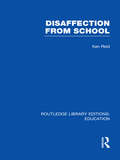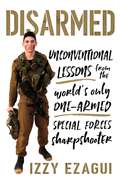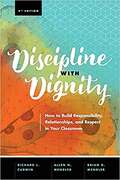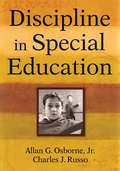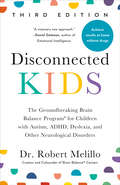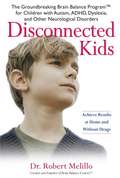- Table View
- List View
Disabled Children and the Law: Research and Good Practice Second Edition
by David Ruebain Janet Read Luke ClementsNow in its completely updated second edition, this accessible guide provides essential information about how the law can be used to promote good practice and policy development for disabled children and young people. The authors take an anti-discriminatory and inclusive approach that involves parents and children in decision-making and advocacy. They summarise recent research on common needs and problems of disabled children, young adults and their families, and what support services are valued by them. Individual chapters cover issues affecting children at different stages in the lifecourse, including receiving diagnosis, ensuring educational and social inclusion, and establishing autonomy and independence in early adulthood. The overlapping legal responsibilities of social services, health and education are explained and changes arising from the Children Act 2004 are highlighted. Disabled Children and the Law is an essential reference for practitioners, policy makers, students and families.
Disabled Children’s Childhood Studies
by Katherine Runswick-Cole Tillie CurranThis collection centres on the experiences of disabled children and young people and aims to develop theories about their childhoods. The powerful first-hand accounts by disabled children, family members and reflections by disabled adults are aimed to inspire the reader to think and, perhaps, act in positive and productive ways about all children's lives. The authors oppose the historical global imposition of problematic views of disability and childhood and offer open discussion of responsive and ethical research approaches. New ways of thinking about disabled children's childhoods in a global context demand poverty reduction and approaches that support families and communities to recognise the contributions disabled children make.
Disabled Ecologies: Lessons from a Wounded Desert
by Sunaura Taylor"With breath-catching insight and enveloping compassion, Sunaura Taylor shares a secret of epochal urgency: people living with injury and impairment have much to teach about how to survive, and perhaps even thrive, on an injured and impaired planet."—Naomi Klein, author of Doppelganger A powerful analysis and call to action that reveals disability as one of the defining features of environmental devastation and resistance. Deep below the ground in Tucson, Arizona, lies an aquifer forever altered by the detritus of a postwar Superfund site. Disabled Ecologies tells the story of this contamination and its ripple effects through the largely Mexican American community living above. Drawing on her own complex relationship to this long-ago injured landscape, Sunaura Taylor takes us with her to follow the site's disabled ecology—the networks of disability, both human and wild, that are created when ecosystems are corrupted and profoundly altered. What Taylor finds is a story of entanglements that reach far beyond the Sonoran Desert. These stories tell of debilitating and sometimes life-ending injuries, but they also map out alternative modes of connection, solidarity, and resistance—an environmentalism of the injured. An original and deeply personal reflection on what disability means in an era of increasing multispecies disablement, Disabled Ecologies is a powerful call to reflect on the kinds of care, treatment, and assistance this age of disability requires.
Disabled Education: A Critical Analysis of the Individuals with Disabilities Education Act
by Ruth ColkerEnacted in1975, the Education for All Handicapped Children Act – now called theIndividuals with Disabilities Education Act (IDEA) provides all children withthe right to a free and appropriate public education. On the face of it, theIDEA is a shining example of law’s democratizing impulse. But is that reallythe case? In Disabled Education, Ruth Colker digs deep beneath theIDEA’s surface and reveals that the IDEA contains flaws that were evident atthe time of its enactment that limit its effectiveness for poor and minoritychildren.Both anexpert in disability law and the mother of a child with a hearing impairment,Colker learned first-hand of the Act’s limitations when she embarked on a legalbattle to persuade her son’s school to accommodate his impairment. Colker wasable to devote the considerable resources of a middle-class lawyer to herstruggle and ultimately won, but she knew that the IDEA would not havebenefitted her son without her time-consuming and costly legal intervention.Her experience led her to investigate other cases, which confirmed hersuspicions that the IDEA best serves those with the resources to advocatestrongly for their children. The IDEAalso works only as well as the rest of the system does: struggling schools thatserve primarily poor students of color rarely have the funds to provideappropriate special education and related services to their students withdisabilities. Through a close examination of the historical evolution of theIDEA, the actual experiences of children who fought for their education incourt, and social science literature on the meaning of “learning disability,”Colker reveals the IDEA’s shortcomings, but also suggests ways in whichresources might be allocated more evenly along class lines.
Disabled Futures: A Framework for Radical Inclusion (D/C: Dis/color #3)
by Milo W. ObournDisabled Futures makes an important intervention in disability studies by taking an intersectional approach to race, gender, and disability. Milo Obourn reads disability studies, gender and sexuality studies, and critical race studies to develop a framework for addressing inequity. They theorize the concept of “racialized disgender”—to describe the ways in which racialization and gendering are social processes with disabling effects—thereby offering a new avenue for understanding race, gender, and disability as mutually constitutive. Obourn uses readings of literature and popular culture from Lost and Avatar to Octavia Butler’s Xenogenesis trilogy to explore and unpack specific ways that race and gender construct—and are constructed by—historical notions of ability and disability, sickness and health, and successful recovery versus damaged lives. What emerges is not only a more complex and deeper understanding of the intersections between ableism, racism, and (cis)sexism, but also possibilities for imagining alternate and more radically inclusive futures in which all of our identities, experiences, freedoms, and oppressions are understood as interdependent and intertwined.
Disabled Justice?: Access to Justice and the UN Convention on the Rights of Persons with Disabilities
by Eilionóir FlynnDisability offers a new lens through which to view the effectiveness of access to justice, and the inclusiveness of the justice system as a whole. This book analyses the experience of people with disabilities through the entire justice system, from making a complaint, to investigation, and through the court/tribunal process. It also considers the participation of people with disabilities in a variety of roles in the justice system - as witness, defendant, complainant, plaintiff, lawyer, judge and juror. More broadly, it also critically examines the subtle barriers of access to justice which might exist in a given society - including barriers to grassroots disability advocacy, legal education and training, the right to vote and the right to stand for election which may apply to people with disabilities. The book is international and comparative in scope with a focus primarily on examples of legal practice and justice systems in common law countries. The work will be of interest to scholars working in the areas of human rights, equality and non-discrimination, disability rights activists and legal professionals who work with people with disabilities to achieve access to justice.
Disabled People and Economic Needs in the Developing World: A Political Perspective from Jordan
by Majid TurmusaniThis book explores the economic situation of disabled people in developing countries focusing on rehabilitation and uses particpatory framework to community development. Although dealing specifically with a case study from Jordan, this needs assessment study provides comparisons with other developing societies. The author considers the prospect for future improvement in disability policy at a time when state budgets are already over stretched by widespread poverty, unemployment and poor health conditions. The book is divided into three parts. Part one explores disability and economic rehabilitation within global context and sets the scene for understanding what disability is and the impact of having disability across cultures with emphasis on the experience of discrimination. Part two deals with disability theory and practice in Jordan in terms of economic policies and provisions available for disabled people. Part three presents concluding remarks on the rise of disability politics in developing countries and the development of a participatory policy agenda.
Disabled People and the Right to Life: The Protection and Violation of Disabled People’s Most Basic Human Rights
by Janet Read Luke ClementsThe most basic of human rights, the right to life, is the focus of this book. 'Human rights' has increasingly come to be seen as a significant framework, both to aid understanding of the experiences of those who face oppression, and to underpin social, legal and political measures to counter it. Disabled People and the Right to Life uses this framework to explore how disabled people’s right to life is understood in different national contexts and the ways in which they are – or are not – afforded protection under the law, emphasizing the social, cultural and historical forces and circumstances which have promoted disabled people’s right to life or legitimated its violation. Written by an international panel of contributors including individuals holding public office, academics from the fields of law, social policy, disability studies and bioethics as well as practitioners and activists attempting to further disabled people’s human rights, this truly interdisciplinary book will be of interest to students and researchers of disability, law, social policy and human rights.
Disabled People, Work and Welfare: Is Employment Really the Answer?
by Chris Grover and Linda PiggottThis is the first book to challenge the concept of paid work for disabled people as a means to ‘independence’ and ‘self determination’. Recent attempts in many countries to increase the employment rates of disabled people have actually led to an erosion of financial support for many workless disabled people and their increasing stigmatisation as ‘scroungers’. Led by the disability movement’s concern with the employment choices faced by disabled people, this controversial book uses sociological and philosophical approaches, as well as international examples, to critically engage with possible alternatives to paid work. Essential reading for students, practitioners, activists and anyone interested in relationships between work, welfare and disability.
Disabled Students in Higher Education: Perspectives on Widening Access and Changing Policy
by Sheila Riddell Teresa Tinklin Alastair WilsonThe authors present results gleaned from eight higher education institutions in Great Britain which demonstrate the level of participation by disabled students.
Disabled Upon Arrival: Eugenics, Immigration, And The Construction Of Race And Disability
by Jay Timothy DolmageIn North America, immigration has never been about immigration. That was true in the early twentieth century when anti-immigrant rhetoric led to draconian crackdowns on the movement of bodies, and it is true today as new measures seek to construct migrants as dangerous and undesirable. This premise forms the crux of Jay Timothy Dolmage’s new book Disabled Upon Arrival: Eugenics, Immigration, and the Construction of Race and Disability, a compelling examination of the spaces, technologies, and discourses of immigration restriction during the peak period of North American immigration in the early twentieth century. Through careful archival research and consideration of the larger ideologies of racialization and xenophobia, Disabled Upon Arrival links anti-immigration rhetoric to eugenics—the flawed “science” of controlling human population based on racist and ableist ideas about bodily values. Dolmage casts an enlightening perspective on immigration restriction, showing how eugenic ideas about the value of bodies have never really gone away and revealing how such ideas and attitudes continue to cast groups and individuals as disabled upon arrival.
Disabled Veterans in History
by David A. GerberDisabled Veterans in History explores the long-neglected history of those who have sustained lasting injuries or chronic illnesses while serving in uniform. The contributors to this volume cover an impressive range of countries in Europe and North America as well as a wide sweep of chronology from the Ancient World to the present. The essays address the emergence of "veteran" as a political category with unique privileges and entitlements and of disabled veterans as a special project--and indeed one of the original projects--of the modern welfare state. The introductory essay, "Finding Disabled Veterans in History," offers perhaps the first attempt at synthesizing knowledge about disabled veterans in Western societies. The other essays examine the representation of disabled veterans from Sophocles Philoctetes to American feature films; the relations of disabled veterans to the state and society in such public policy issues as pensions, medical care, physical rehabilitation, and job retraining; and the disabled veteran's agency and experience in reentering the peacetime world. Other topics include the place of disabled veterans in societies defeated in war; the fate of disabled veterans in societies experiencing frequent changes of political regimes; the emergence of pensions and vocational rehabilitation for disabled veterans; and the abiding problem of alcohol abuse among disabled veterans. The contributors come from a variety of disciplines, including history, physical rehabilitation, Slavic studies, sociology, communication and media, and museum studies. The book will be of interest especially to researchers in the fields of war and society, the welfare state, and disability studies, as well as those in the medical, rehabilitation, and counseling fields.
Disabled Witchcraft: 90 Rituals for Limited-Spoon Practitioners
by Kandi ZellerMagick is all around us and should be for everyone. But the practices in many witchcraft books can be difficult for many of us to perform due to chronic illnesses, sensory issues, allergies, or other disabilities—and the financial limitations that often go hand in hand with them. In this guide, disabled witch Kandi Zeller sets out to change that. Through 90 inclusive (and sometimes spicy) magickal rituals designed for witches with disabilities of all kinds—especially the invisible ones—Disabled Witchcraft lays out a truly accessible magickal practice with a solid dose of humor and heart. If your spoons (aka available energy and executive function) are limited on any given day, that doesn't need to be a hindrance to following your spiritual path. From guidance on using crystals for nervous-system regulation to tarot readings for spoonies to laying a curse upon unjust health systems, you'll find practical tools to harness the magick of your disabilities, fight both ableism and capitalism, and embrace a more expansive version of the path.
Disabled, Female and Proud!: Stories of Ten Women with Disabilities
by Harilyn Rousso Susan Gushee O'Malley Mary SeveranceThis book contains stories of ten women with disabilities who are out doing it, raising families, working, and being active in their communities. Woven through this book is the history of the Disability rights movement. This book is directed towards teen women, but is a good read for all.
Disabling America: The Unintended Consequences of the Government's Protection of the Handicapped
by Greg Perry“Presents competent arguments along with shocking, interesting, and inspiring stories . . . a solid case against the ADA—and a great read at that.” —The Objective StandardDespite what many politicians would like you to believe, the Americans with Disabilities Act is a travesty of government regulation—it actually harms businesses, taxpayers, and, ironically, the people it’s supposed to help: disabled Americans. In fact, it is such a disaster that Greg Perry, a man who himself was born disabled, declares in this eye-opening book, “I am so very grateful that I was born long before the ADA was put into law.”Feisty and frank, Perry exposes the dangerous consequences of this supposedly compassionate law and shows through personal accounts and sobering statistics that quality of public life for the disabled hasn’t been improved since the ADA was signed into law; instead, the liberties of all Americans have been diminished considerably. Citing alarming, outrageous examples of frivolous lawsuits, unnecessary reliance on government intervention, reams of bureaucratic red tape, and stifled economic growth for all, Perry boldly contends that the Americans with Disabilities Act has fostered a culture of dependence, dangerously convincing many people that they can’t make it without the government’s help.Told with the passion and conviction of a man who has seen firsthand the many ways such intrusive government threatens our freedom, this book finally exposes how the ADA is a legislative disaster that, in effect, disables all Americans.
Disabling Barriers, Enabling Environments (Third Edition)
by Carol Thomas John Swain Sally French Colin Barnes`The strengths of this text are many. It has breadth and diversity in its content yet is presented in bite-size chapters. For those wishing to know more, it offers signposts to the relevant literature. The contributors have been carefully selected for their specific perspective yet these have been skilfully inter-related by the editors. It is now some 11 years since the first edition of this text was published. In my view, this second edition was worth the wait' - SCOLAG Journal `This has been a ground-breaking book...and I whole-heartedly welcome a new edition'- Professor Len Barton, School of Education, The University of Sheffield `It is a really well-structured book which has been very popular and widely used by students...Its great qualities are accessibility and diversity of contributors' - Jenny Corbett, Institute of Education, University of London `This book would be a valuable resource to students of disability studies and to health and social care staff and other professionals who work with disabled people'- Disability and Rehabilitation The Second Edition of this landmark text has been revised to provide an up-to-date accessible introductory text to the field of disability studies. In addition to analysing the barriers that disabled people encounter in education, housing, leisure and employment, the revised edition has new chapters on: · international issues · diversity among disabled people · sexuality · bioethics. Written by disabled people who are leading academics in the field, the text comprises 45 short and engaging chapters, to provide a broad-ranging and accessible introduction to disability issues. Disabling Barriers, Enabling Environments is an invaluable resource for both students and practitioners alike. It is an ideal text for undergraduates and postgraduates taking courses in disability studies, as well as disability courses in social work, education, health studies, sociology and social policy.
Disabling Migration Controls: Shared Learning, Solidarity, and Collective Resistance (ISSN)
by Rebecca YeoWhen people are prevented from meeting their needs, the impact is disabling, whether in the immigration system or in the wider population. Drawing on many years of research and activism, this book argues that insights from the disabled people’s movement, particularly the original Social Model of Disability, can be usefully extended to focus resistance on the disabling restrictions imposed on people subject to asylum and immigration controls.While acknowledging the pain and discomfort of many impairments and of forced displacement, the book focuses on injustices that can be changed. It does not catalogue the hostility of the ‘hostile environment’. Nor does it promote inclusive asylum restrictions. An unjust system is not transformed by including disabled people. Policies designed to deprive people of essential needs and to stoke hatred among the wider population are core elements of the rise of fascism. In this context, bringing together movements for disability and migrant justice could help build urgently needed solidarity and resistance with which to develop a society based on equity and common humanity.Quotations and images are used to convey the messages and priorities of disabled people seeking asylum, ensuring that the book is both engaging and grounded in the insights of lived experience. This book will interest people seeking to improve social justice, including scholars of disability, migration, sociology and politics.
Disabling Mission Enabling Witness: Exploring Missiology Through the Lens of Disability Studies (Missiological Engagements)
by Benjamin T. ConnerHow would it look if we "disabled" Christian theology, discipleship, and theological education? Benjamin Conner initiates a new conversation between disability studies and Christian theology and missiology, imagining a church that fully incorporates persons with disabilities into its mission. In this vision, people with disabilities are part of the church's pluriform witness, and the congregation embodies a robust hermeneutic of the gospel.
Disabling Policies?: A Comparative Approach to Education Policy and Disability (Routledge Library Editions: Children and Disability #7)
by Gillian FulcherFirst published in 1989, this book is about integrating or mainstreaming policies, looking specifically at how to improve circumstances for schoolchildren with disabilities or handicaps, and their teachers. The author draws on her experiences, both within and outside the academic institution, to conceptualise and theorise policy, so as to place this policy in a political framework and locate it in a wider model of social life. This model is then used to disentangle the nature and effects of policy practices surrounding integration and mainstreaming, looking at practice in various parts of Europe, the US and Australia, at that time. Although written at the end of the 1980s, this book discusses topics that are still relevant today.
Disaffection From School (Routledge Library Editions: Education)
by Stephen Hester David H Hargreaves Frank J MellorA large number of pupils are, or are liable to become, disaffected with their schooling. In this comprehensive account of the problem, Ken Reid suggests that school can and should do much more to prevent and overcome disaffected behaviour, as manifested by such factors as absenteeism, disruption and underachievement. The book covers disruptive behaviour in its broader context and examines the search for an explanation within schools themselves. Formal and multidisciplinary approaches to the problem are also fully treated. The author has drawn on his considerable school and research experience and the book is well illustrated with examples and case histories. Ken Reid argues that questions about attitudes and approaches in teaching and in pastoral care provoke a continued challenge, and stresses that if such questions are not faced squarely the long-germ prognosis for secondary education in Britain may be bleak. Teachers in training and all those involved in the education and welfare of difficult or disadvantaged children, especially teachers, heads and social workers, will find Disaffection from School both challenging in its analysis and helpful in its suggestions.
Disarmed: Unconventional Lessons from the World's Only One-Armed Special Forces Sharpshooter
by Izzy EzaguiThe inspiring story of a young American who volunteered to fight in the Israel Defense Forces, lost his arm in combat, and then returned to the battlefield.Combining refreshing candor with self-deprecating wit, this inspiring memoir will encourage readers to live up to their aspirations despite seemingly impossible odds.On January 8, 2009, Izzy Ezagui--an American who had enlisted in the Israel Defense Forces (IDF) at nineteen--lost his arm in a mortar attack on the border of the Gaza Strip. In this stirring and wryly humorous memoir, Izzy recounts his tortuous trek through rehabilitation to re-enlistment as a squad commander in the IDF. He became the world's only one-armed Special Forces sharpshooter.This isn't a typical war chronicle, full of macho bluster and the usual hero tropes. Izzy wrote this book with his fellow millennials in mind--not necessarily those with military ambitions, but everyone facing life's daily battles. His message is universal: if a self-described "nerd" and "one-armed basket case" like him can accomplish what he set his mind to, then anyone can become a hero in his or her own life.Growing up in a religious household in Miami, Izzy's early life was plagued by self-doubt, family drama, and (far too few) girl troubles. His search for direction eventually led him to that explosion on the Gaza border, changing his life forever.In the midst of disaster, Izzy discovered a deep well at his core, from which he could draw strength. Through his motivational speeches across the world, and now through this book, he encourages people to seek their own power, and to face whatever adversity life throws at them.
Discipline With Dignity, 4th Edition: How To Build Responsibility, Relationships, And Respect In Your Classroom
by Brian D. Mendler Richard L. Curwin Allen N. MendlerIn this revised and updated 4th edition, Discipline with Dignity provides in-depth guidance for implementing a proven approach to classroom management that can help students make better choices and teachers be more effective. Emphasizing the importance of mutual respect and self-control, the authors offer specific strategies and techniques for building strong relationships with disruptive students and countering the toxic social circumstances that affect many of them, including dysfunctional families, gangs, and poverty. Educators at all levels can learn The difference between formal and informal discipline systems and when to use each. The role of values, rules, and consequences. How to address the underlying causes of discipline problems that occur both in and out of school. What teachers can do to defuse or prevent classroom disruptions and disrespectful behavior without removing students from the classroom. Why traditional approaches such as threats, punishments, and rewards are ineffective—and what to do instead. How to use relevance, teacher enthusiasm, choice, and other elements of curriculum and instruction to motivate students. How to reduce both teacher and student stress that can trigger power struggles. With dozens of specific examples of student-teacher interactions, Discipline with Dignity illustrates what you can do—and not do—to make the classroom a place where students learn and teachers maintain control in a nonconfrontational way. The goal is success for all, in schools that thrive.
Discipline in Special Education
by Allan G. Osborne Charles J. RussoExperts provide educators with legal guidelines for taking appropriate disciplinary action that can withstand legal challenges without violating the rights of students with disabilities under IDEA 2004.
Disconnected Kids, Third Edition: The Groundbreaking Brain Balance Program for Children with Autism, ADHD, Dyslexia, and Other Neurological Disorders
by Dr. Robert MelilloA revised and updated edition of the proven, drug-free program to treat the cause—not just the symptoms—of autism spectrum disorders, ADHD, and related neurological conditionsDiagnosis rates of neurological disorders—including autism spectrum disorders, ADHD, dyslexia, and obsessive-compulsive disorders—are climbing at an alarming rate. Yet psychiatric drugs don&’t cure the problems; they only disguise the symptoms. Dr. Robert Melillo&’s pioneering work that began in the 1990s with the creation of his groundbreaking Brain Balance program has brought a new understanding to the cause of these conditions: an imbalance between the left and right sides of the child&’s developing brain. Today, more than fifty thousand children have successfully completed the Brain Balance program and have experienced dramatic improvements in behavioral, emotional, social, and academic outcomes.Disconnected Kids is a comprehensive at-home guide to the Brain Balance program, which involves no medication or medical interventions but focuses instead on movement and sensory exercises that stimulate proper brain development. This updated and revised edition also features new exercises and the latest research findings on how the retention of primitive reflexes—the involuntary movements babies are born with that typically are replaced with intentional movements by their first birthday—plays an integral role in the development of neurological issues. Through the exercises in this book, these reflexes can be diminished, making brain balance easier to attain. Disconnected Kids helps readers guide children susceptible to a brain imbalance to overcome challenges and allow their true gifted selves to shine.
Disconnected Kids: The Groundbreaking Brain Balance Program for Children with Autism, ADHD, Dyslexia, and Other Neurological Disorders
by Robert MelilloBased on years of scientific research and used to successfully treat approximately 1,000 children to date, Dr. Robert Melillo's Brain Balance Program addresses not just the symptoms of what's plaguing our kids but the cause. In Disconnected Kids, Dr. Melillo presents an individualized at-home program that allows readers to assess, address, and even correct their child's neurological disconnects using simple physical, sensory, and academic exercises.
